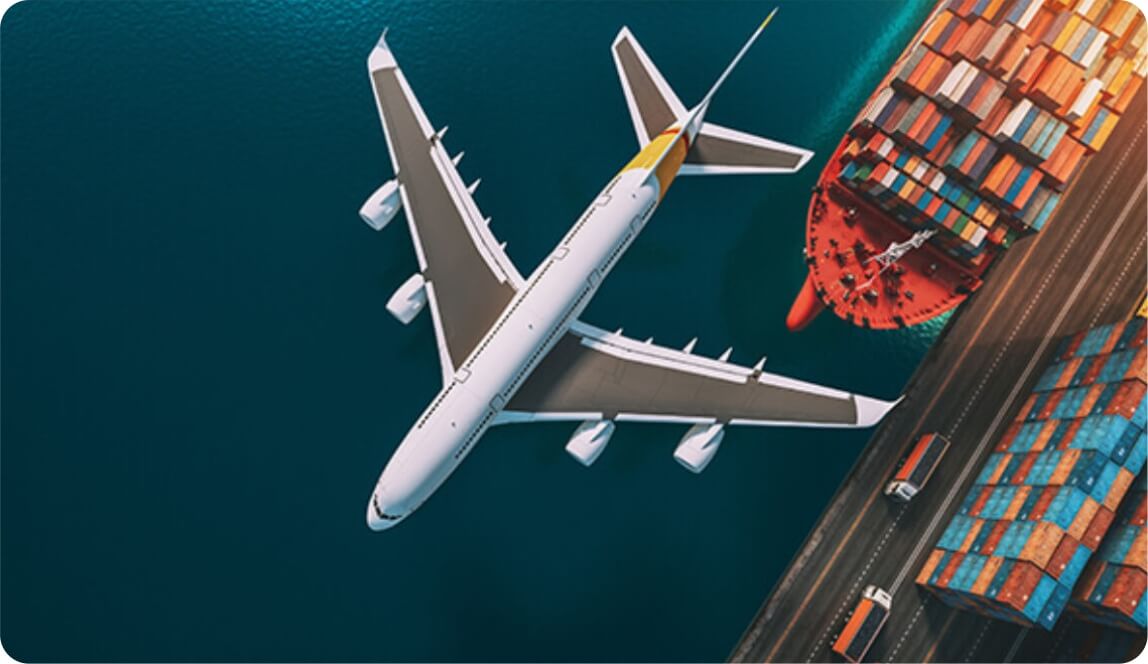




Today's world is heavily dependent on a swift movement of goods from one place to the other. And most often this movement happens through ocean freight, also known as sea freight . From clothing to raw materials and from electronics to food items, sea freight has been making our lives better in a silent manner.
For business owners or for anyone who is exploring shipping options, it's important to know how sea freight works, its features and effects. And that's what we will be doing in this blog. We will walk you through ocean freight meaning and its process and will explain why you should consider it for your shipping needs.
So, let's dive in and explore the world of ocean freight.
The term 'ocean freight' itself gives away the ocean freight meaning. Ocean freight is the process of transportation of goods through cargo ships across seas and oceans. Ocean freight is arguably the oldest system of moving large volumes of goods internationally. Ocean freight involves massive vessels which include container ships and bulk carriers. With time, the design of these vessels has been evolved to ensure they carry everything from standardized containers to oversized machinery. These vessels are also equipped to carry loose cargo like grains and coal.
On a broad level, there are two primary types of ocean freight services :
Full Container Load (FCL):
In this type, you book an entire container for your goods. This is the best option for large shipments or when you want your cargo to remain untouched during transit.
Less than Container Load (LCL):
As the name suggests, in this option, your goods share container space with other shippers’ cargo. You can use this option when you only require to send smaller shipments and a full container is not needed.
One thing to note is that sea freight is typically slower than air freight. Which means your cargo takes a lot more time to reach the destination. Based on the destination, the time taken can range from a couple of weeks to over a month.
But interestingly, the lack in speed is compensated by the features such as cost-efficiency, capacity, and reliability.
Choosing the right shipping method can be an overwhelming task as there are multiple options available such as air, rail, and road transport. So, why should you opt for ocean freight? Here is a list of some compelling reasons that make sea freight the best choice for businesses worldwide.
Cost-Effective for Large Shipments
When it comes to quantity, ocean freight is the winner. If you need to move large quantities of goods, then ocean freight is the most budget-friendly option. Other options such as air freight can be prohibitively expensive for heavy or bulky items. So, if you are looking for a cheap transport option, sea freight offers significant savings.
For example, shipping a container of electronics from Asia to North America via ocean freight can be a lot cheaper than sending it through air transport. Hence, when you are looking to optimize your supply chain costs without compromising on reliability, opt for ocean freight.
Ideal for Bulky and Heavy Cargo
If you need to ship something massive, like industrial machinery or construction materials, then don't look beyond ocean freight because ocean freight is built for this. Cargo ships are specifically designed to handle heavy, oversized, or oddly shaped items that are difficult to fit in an airplane’s cargo hold. Through ocean freight, you can transport vehicles, steel beams, or pallets of consumer goods with ease.
Environmentally Friendly
This is the era of 'sustainable businesses.' For most businesses, these days, sustainability is a priority. And in this regard, ocean freight stands out as a greener alternative to air freight because cargo ships emit significantly less CO2 per ton of cargo compared to airplanes.
The businesses which are aiming to reduce their carbon footprint, choosing sea freight is an ideal way to stay committed to their eco-conscious goals without compromising on logistical needs. Also, the fact that modern shipping companies are investing in fuel-efficient vessels and cleaner technologies reinforces the fact that ocean freight is a more sustainable choice.
Global Reach and Reliability
Thanks to the availability of ports in nearly every corner of the world, ocean freight offers seamless connectivity to businesses. Major trade routes including the routes between Asia, Europe, and the Americas, are well-established, with reliable schedules. Of course, there are occasional delays due to weather or port congestion, but they are generally rare. Moreover, experienced logistics providers like Atlantic use advanced tracking and planning to keep your cargo on track.
Versatility for All Types of Goods
Ocean freight offers tremendous flexibility to accommodate all types of goods. There are refrigerated containers known as reefers for perishables, while specialized tanks move hazardous materials from one place to the other.
Need to ship temperature-sensitive pharmaceuticals? No problem. Moving chemicals that require strict safety protocols? Sea freight has you covered. This versatility provides ocean freight a massive edge and makes it a go-to solution for industries ranging from retail to manufacturing to agriculture.
Now that we are clear with ocean freight meaning, let's look at when you can use ocean freight for your business. Here are a few situations when ocean freight proves to be the best option:
At the same time, kindly note that if you are dealing with urgent shipments such as perishable food or last-minute retail stock, air freight might be a better option than sea freight. If you are unclear about which mode to select, consult a skilled logistics partner as they can help you weigh the pros and cons to make the best decision.
So now that we are all set to reap the benefits of using ocean freight, let's look at a few tips that would make your shipping experience better.
At Atlantic International Express, we have spent years perfecting the art of ocean freight. We know that every shipment is unique, and hence create tailored solutions that fit your business like a glove. We help you in securing the best rates and navigate complex customs regulations. And most importantly, our team of experts is with you every step of the way. We offer transparency, reliability, and a knack for making logistics feel effortless.
Whether you are shipping a single container or managing a global supply chain, we have all the resources, tech-driven tools, and connections to deliver. Let us handle the heavy lifting (or heavy shipping, in this case) so you can focus on growing your business.
So are you geared up to ship by sea? Ocean freight is not just a shipping method. It is a strategic choice that can save you money, can support your sustainability goals, and open up new markets. By understanding its benefits and partnering with a trusted logistics provider, you can make sea freight a cornerstone of your supply chain.
Want to know how ocean freight can work for you? Reach out to our team today for a personalized consultation. Let’s get your cargo moving across the seas, smoothly and efficiently.
Happy shipping!
Sea freight forwarding involves managing the shipping of goods through cargo ships. A freight forwarder coordinates logistics, from booking vessels to handling customs.
Sea freight charges include the costs of shipping goods via cargo ships, including freight rates, surcharges (e.g., fuel or peak season fees), and port handling fees. Costs vary by shipment size, distance, and cargo type. At Atlantic, we offer transparent pricing and competitive rates.
Sea freight takes 1–6 weeks, depending on the route and port handling. Short routes may take 1–2 weeks; intercontinental ones, 3–6 weeks. At Atlantic, we offer real-time tracking for clarity.